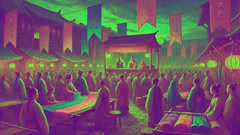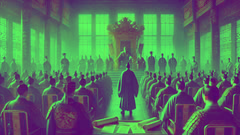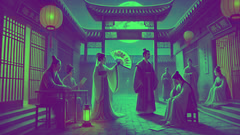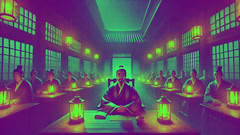Introduction
In the heart of ancient Kaifeng, beneath the watchful eaves of Song dynasty pagodas, there lived a man whose name would echo for centuries: Judge Bao Zheng. The city teemed with traders and scholars, its air heavy with incense and the aroma of bubbling street food, yet there was a deeper pulse—a yearning for justice that many thought impossible in the shadowed corridors of power. Judge Bao stood apart, a scholar-official with a broad brow, steady eyes, and an aura that commanded both fear and reverence. His reputation, even in his own time, was the stuff of whispered tales: a judge who dared to speak truth to emperors, who brooked no bribe, who saw neither noble nor peasant in his court—only right and wrong.
It was said his lantern burned all night, illuminating the path for the wronged and the weary. Merchants spoke of him with awe, mothers invoked his name to frighten unruly children, and even the powerful treaded lightly in his presence. Bao Zheng’s sense of justice did not arise from lofty ideals alone but from the soil of hardship—he’d seen famine, corruption, and the law twisted for the whims of the wealthy. Yet, from these trials, he carved out a code sharper than any sword.
Across the length of the dynasty, as emperors came and went, Judge Bao’s legend only grew. He solved cases others abandoned, righted ancient wrongs, and exposed the schemes of those who would prey on the innocent. In the smoky glow of temple lanterns or beneath the open sky, he listened not to the sweet words of the influential but to the silent cries of the common people. His gavel, it was said, could split mountains; his scrolls, a map for justice itself.
The legend of Judge Bao Zheng is more than the tale of a government official. It’s the story of how one man’s unwavering heart could become a beacon for an entire nation, lighting the way for future generations to seek fairness, wisdom, and courage in the face of darkness.
The Case of the Crimson Silk: Shadows in the Marketplace
Kaifeng’s marketplace was a riot of color and sound—banners fluttered, merchants hawked their wares, and children darted between baskets of lychees and bolts of silk. But beneath this surface energy, a simmering fear had taken root. For weeks, wealthy merchant houses found themselves targeted by mysterious thefts. The most recent loss—a roll of crimson silk destined as tribute for the imperial court—sent the city into uproar. The Governor’s guards, quick to lay blame, seized a young weaver named Lin Mei. The evidence seemed overwhelming: a scrap of crimson silk clutched in her trembling hand, a trail leading to her modest home.

Yet, as Lin Mei stood in the great hall before Judge Bao, a hush fell over the crowd. Bao Zheng regarded her not with suspicion, but with a searching gaze. “Tell me,” he said, his voice low and steady, “how came this silk to your hand?” Lin Mei’s story was simple. She worked for one of the accused merchant families. That evening, as rain battered Kaifeng’s tiled roofs, she’d found the silk discarded near a storm drain while on her way home. She’d picked it up, intending to return it the next day.
Judge Bao summoned the head merchant, the Governor’s captain, and a handful of witnesses. He sent his trusted assistant, Gongsun Ce, to investigate the drain where Lin Mei claimed to have found the silk. In less than a day, Gongsun Ce returned, bearing a handful of coins and other valuables—all wet and muddied—from the same spot. Someone, it seemed, had used the storm to mask a theft, hoping to blame an innocent for their crime.
Judge Bao ordered each witness to recount their movements that night. As stories twisted and unraveled, suspicion landed upon the Governor’s captain himself. Under sharp questioning, his composure broke; he’d orchestrated the theft, planning to sell the silk and blame a vulnerable worker. Judge Bao’s ruling was swift and public: the captain stripped of rank, Lin Mei exonerated. The crowd’s cheer was deafening. For many, it was their first taste of true justice—a verdict delivered not to serve the powerful, but the truth.
The Mandate of Heaven: Corruption in the Imperial Court
Word of Judge Bao’s integrity reached even the marble halls of the imperial palace. It was here, beneath ornate eaves and gilded dragons, that the greatest dangers lurked—not from thieves or bandits, but from the insidious rot of corruption. The Emperor himself had summoned Bao Zheng to investigate whispers of embezzlement among his ministers. The accused was Minister Liang, a man of vast influence whose reach extended from the lowest clerk to the Emperor’s own council.

The case was a perilous one. Ministers closed ranks. Servants vanished. Documents were destroyed or falsified. Even the Emperor’s patience wore thin, for a scandal could stain the dynasty’s very legitimacy. Bao Zheng, however, would not be deterred. With Gongsun Ce’s keen mind and the loyal constable Zhan Zhao’s quiet strength, he began his search. Night after night, Bao pored over dusty ledgers by candlelight, tracing oddities in grain shipments and tax rolls. He noticed patterns: villages supposedly receiving aid that never arrived, roads paid for but left unbuilt.
In a bold move, Judge Bao traveled incognito to the countryside. There he found families scraping by on rotten rice, their homes barely standing. The contrast with Minister Liang’s opulent estate could not have been starker. Bao gathered testimony, quietly and meticulously, until he returned to Kaifeng with a trove of evidence.
In open court, Bao Zheng confronted Minister Liang. The minister blustered and threatened, invoking his status and connections. But as Bao read aloud the list of villages left destitute by Liang’s greed, the weight of truth bore down. Bao did not flinch when even the Emperor hesitated, reminding all that the Mandate of Heaven was not for those who betrayed their people. Liang was stripped of his titles and exiled. For generations after, this case would remind officials that none stood above the law—not even the Emperor’s favorites.
Beneath the Moon Gate: The Case of the Painted Fan
The monsoon rains had passed, leaving Kaifeng washed and shining beneath a full moon. In this quiet interlude, Judge Bao found himself called to a new case—one whispered about in the tea houses and among palace servants: the disappearance of Lady Yu’s painted fan. But this was no ordinary object. The fan was a wedding gift from Lady Yu’s late husband, adorned with poetry and a miniature painting of their family’s ancestral village. Its sentimental value far outweighed gold or jade.

Suspicion quickly fell on Lady Yu’s servant girl, Xiu Ying, who’d recently asked to visit her sick mother. But Bao Zheng was wary of easy answers. He visited Lady Yu’s home, moving from moonlit courtyards to shadowed corridors, questioning everyone from cooks to gardeners. In a quiet moment, he noticed muddy footprints near the pond—far from any kitchen or living quarters. Following the trail, Bao found a half-opened gate leading to the home of Lady Yu’s cousin.
With Gongsun Ce’s help, Bao pieced together the real story: Lady Yu’s cousin coveted the fan, hoping to sell it to a foreign trader. Xiu Ying had discovered the theft but, fearing she’d be blamed, kept silent and tried to warn Lady Yu in secret. Bao presented the evidence in court, clearing Xiu Ying’s name and restoring the fan to its rightful owner.
Yet, it was Lady Yu’s tears of gratitude and Xiu Ying’s shy smile that remained in Judge Bao’s memory long after. For him, every case was more than a riddle to be solved—it was a life restored, a dignity returned. As news spread through Kaifeng’s streets, lanterns glowed just a little brighter that night.
Conclusion
Judge Bao Zheng’s legacy endures far beyond the dusty courts and bustling streets of Song dynasty Kaifeng. His unwavering commitment to justice, his fearless pursuit of truth, and his deep empathy for the common people forged an example that would echo through generations. Even as stories of his cases grew into legend—embroidered and retold from village hearths to imperial libraries—the heart of his legend remained unchanged: one man’s devotion could challenge corruption and inspire an entire society to dream of fairness. Bao Zheng’s name became synonymous with integrity not because he was without flaw, but because he refused to be swayed by power or fear.
In times of uncertainty, when shadows grew long and faith in law faltered, people would remember the lantern burning late in Judge Bao’s court. His wisdom and courage showed that justice is not a distant ideal, but a living promise—one that demands vigilance, compassion, and above all, the courage to act. His story invites us all to ask: in our own lives, can we carry the lantern forward? In seeking truth, in defending the vulnerable, in standing firm against injustice—perhaps we honor Judge Bao most by striving to become lanterns ourselves, lighting the way for others.













